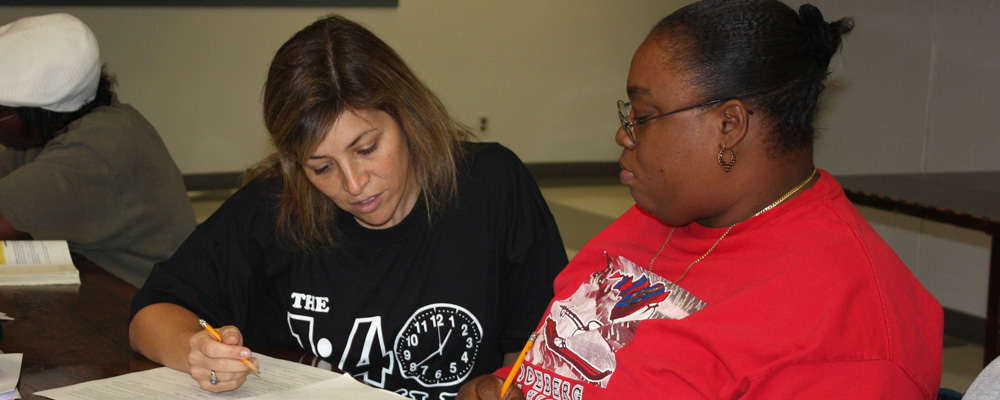
The mathematics department prides itself on meeting students where they are in terms of math ability and helping them achieve their educational goals. These goals can vary from needing basic arithmetic/algebra skills to needing courses such as statistics, calculus, computer science, and others. Many of these courses are designed specifically for transfer, enabling students to complete their first two years of coursework leading to a Bachelor’s degree in virtually any field of study at a four year college or university.
The College offers varied methods of instruction in mathematics.
The math department also offers mentoring and tutoring through the Math 1:40 Club led by full-time instructors. SSC is active in the American Mathematical Association for Two Year Colleges (AMATYC) and the Illinois Mathematics Association of Community Colleges (IMACC).
Mission
The mission of the mathematics department is to assist in the placement of students into the highest math class in which they can be successful and to nurture students in developing critical thinking skills. Our aim is to bolster students’ capacity to become clear thinkers and good decision makers and to encourage students to apply logical thinking skills used in their math courses into the study of other subjects.
Program Student Learning Outcomes (SLOs)
DEVELOPMENTAL MATHEMATICS
- Students will perform operations on whole numbers, integers, fractions, decimals, and percents and use these computational skills to solve applications.
- Students will transition from arithmetic to algebra.
- Students will use critical thinking to solve problems and distinguish between families of functions and sets of numbers.
- Students will develop algebraic skills needed to transition to college level mathematics.
LIBERAL ARTS MATHEMATICS
- Students will demonstrate quantitative, analytic, and problem-solving skills.
- Students will develop a knowledge of the relationship between mathematics and other fields of endeavor.
- Students will use technology appropriately.
STEM MATHEMATICS
- Students will analyze mathematical problems in order to formulate a correct problem-solving approach.
- Students will integrate algebraic methodology with technology to analyze and verify results.
- Students will develop a knowledge of the relationship between mathematics and other fields of endeavor.
Additional Information
The College uses the ALEKS placement system to determine the highest math class for which a student is prepared. Students can use the ALEKS system to improve their placement by using the online modules to refresh their skills. In addition, a mathematics department blog that stores a number of additional resources for students is available at the SSC Math Department blog.
Recommended AS Transfer Curriculum for Mathematics
For students interested in mathematical analysis and applications, spatial relations, data analysis, or mathematics education. Combinations of math degrees with other fields (engineering, business, elementary education) can open many doors. Math and science teachers at all levels of education are in great demand.
This is only a suggested transfer program and might not be appropriate for every student. Some four-year institutions accept more than 62 credit hours in transfer to fulfill requirements in mathematics. Consult the Transfer Center for help in selecting courses appropriate for the program at the college or university where you plan to transfer.
Faculty are available during scheduled office hours to advise students about their courses and program. Peruse the offerings in the Department of Mathematics.
Overview for College Success
Overview for College Success (OCS 121) is a course is designed to assist students in the navigation of becoming successful in college and life. Major topics include setting academic, career and personal goals; effective communication strategies; study skills; critical thinking; self-discovery; and learning styles. In addition, this course delves into topics such as stress management, diversity and other well-being topics. Students will develop educational and career plans, learn to utilize college resources and receive extensive help in course planning. OCS 121 credit is not calculated in the course minimum credit totals listed in this section.
Students must take OCS 121 if they meet one or more of the following:
- First time degree seeking students.
- Transfer student with less than 12 credit hours and no evidence of similar course on transcript.
- Registering for 6 or more credits.
- Test into 2 or more developmental classes.
- Currently does not have OCS credit or registered for OCS.
Minimum General Education (44-45)
| Overview for College Success | CREDITS | |
|---|---|---|
| OCS 121 | Overview for College Success | 1 |
| Communications (9) | ||
|---|---|---|
| ENG 101 | Composition and Rhetoric | 3 |
| ENG 102 | Composition and Research | 3 |
| SPE 108 | Oral Communication | 3 |
| Humanities and Fine Arts (9) | ||
| GROUP II | Select from Humanities and Fine Arts Electives Students earning an Associate degree must meet the requirement for coursework on improving human relations as defined in Public Act 87-581. |
9 |
| Social and Behavioral Science (9) | ||
| ECO 201 | Principles of Economics, Macro (recommended) | 3 |
| GROUP III | Select from Social Science Electives Students earning an Associate degree must meet the requirement for coursework on improving human relations as defined in Public Act 87-581. |
9 |
| Mathematics (5) | ||
| MTH 190 | Calculus and Analytic Geometry I | 5 |
| Physical and Life Science (7-8) | ||
| GROUP V | Select from Physical and Life Science Electives. (Must include one lab) | 7-8 |
Area of Concentration/Electives (22-23)
The selected electives listed below may satisfy the additional Math and Physical or Life Science courses required for the AS.
| ECO 202 | Principles of Economics, Micro (recommended) | 3 |
| MTH 203 | Calculus and Analytic Geometry II | 5 |
| MTH 204 | Calculus and Analytic Geometry III | 5 |
| MTH 205 | Differential Equations | 3 |
| Minimum for AS Degree | 62 | |
|---|---|---|
